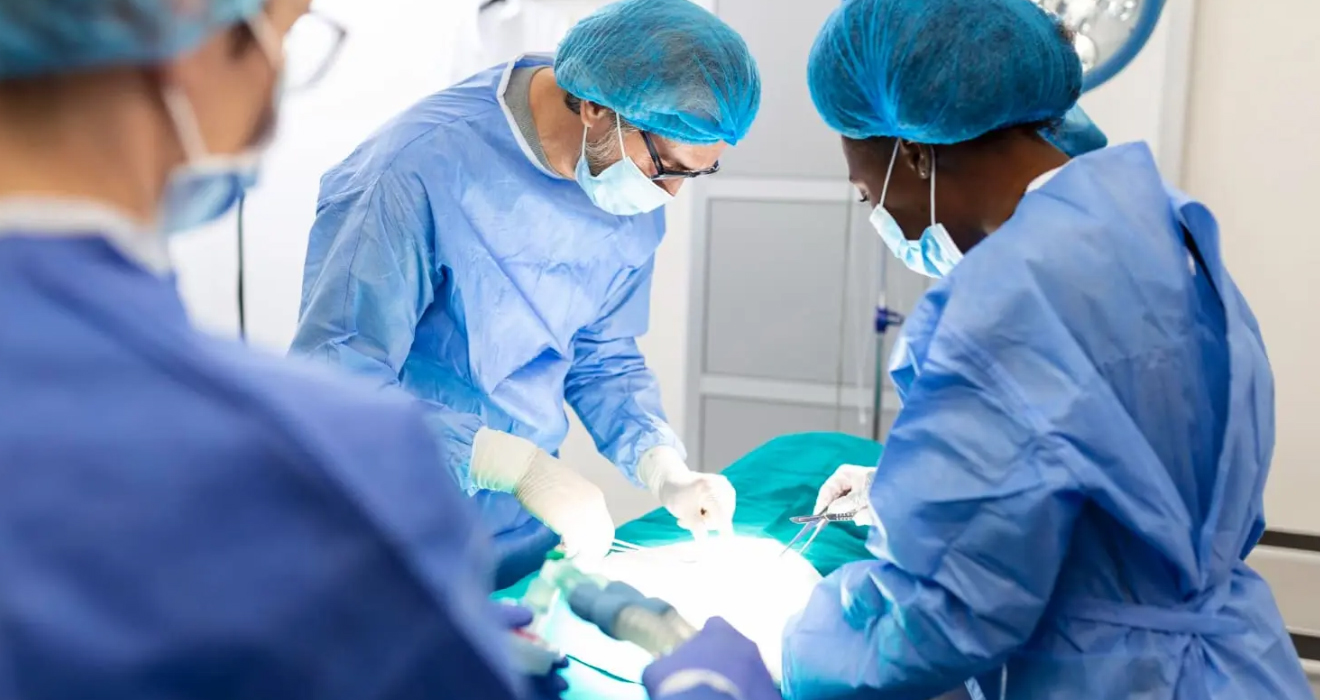General Surgery Department
General surgery is a surgical specialty that focuses on a wide range of surgical procedures involving various parts of the body. General surgeons are trained to manage a broad spectrum of diseases and conditions that require surgical intervention. They perform operations on the gastrointestinal tract, liver, pancreas, endocrine system, breast, skin, and soft tissues, among others.




Gastrointestinal Surgery:
- Surgery of the esophagus, stomach, intestines, colon, liver, gallbladder, and bile ducts.
- Procedures such as appendectomy, cholecystectomy (gallbladder removal), and hernia repair.
Colorectal Surgery:
- Treatment of diseases of the colon, rectum, and anus.
- Procedures such as colectomy (removal of part of the colon) and hemorrhoidectomy.
Breast Surgery:
- Management of benign and malignant breast diseases.
- Procedures such as lumpectomy, mastectomy, and sentinel lymph node biopsy.
Endocrine Surgery:
- Surgery of the thyroid, parathyroid, adrenal glands, and other endocrine organs.
- Procedures such as thyroidectomy and adrenalectomy.
Hepatobiliary Surgery:
- Surgery of the liver, gallbladder, and bile ducts.
- Procedures such as liver resection and bile duct surgery.
Trauma Surgery:
- Management of traumatic injuries, often as part of a trauma team in emergency settings.
- Procedures to control bleeding, repair injuries, and stabilize patients.
Vascular Surgery:
- Treatment of diseases of the blood vessels, excluding the heart and brain.
- Procedures such as varicose vein surgery and access for dialysis.
Skin and Soft Tissue Surgery:
- Treatment of skin cancers, cysts, lipomas, and other soft tissue disorders.
- Procedures such as excision of skin lesions and abscess drainage.
Minimally Invasive Surgery:
- Laparoscopic and robotic-assisted surgery for various conditions.
- Benefits include smaller incisions, less pain, and quicker recovery times.
- Appendectomy: Removal of the appendix, commonly performed for appendicitis.
- Cholecystectomy: Removal of the gallbladder, often due to gallstones.
- Hernia Repair: Repair of inguinal, umbilical, or incisional hernias.
- Colectomy: Removal of part or all of the colon, often due to cancer or inflammatory bowel disease.
- Mastectomy: Removal of one or both breasts, typically to treat or prevent breast cancer.
- Thyroidectomy: Removal of the thyroid gland, usually due to cancer, hyperthyroidism, or large goiters.
- Gastrectomy: Removal of part or all of the stomach, often for cancer or severe ulcers.
- Hemorrhoidectomy: Surgical removal of hemorrhoids.
- Laparoscopy: Minimally invasive surgery using small incisions and a camera to perform procedures such as gallbladder removal and hernia repair.
Diagnosis and Evaluation:
- Conducting thorough medical histories and physical examinations.
- Ordering and interpreting diagnostic tests such as blood tests, imaging studies, and biopsies.
Treatment Planning:
- Developing individualized treatment plans based on the patient's condition.
- Discussing treatment options, potential risks, and benefits with patients and their families.
Surgical Intervention:
- Performing surgical procedures to treat a variety of conditions.
- Managing preoperative, intraoperative, and postoperative care.
Patient Management:
- Monitoring patient progress and recovery.
- Addressing complications and making adjustments to treatment plans as needed.
Emergency Care:
- Providing immediate surgical care for acute conditions such as trauma, appendicitis, and gastrointestinal perforations.
Education and Counseling:
- Educating patients about their conditions, surgical procedures, and postoperative care.
- Providing counseling on preventive measures and lifestyle modifications to improve health outcomes.
- Medical School: Completion of a Doctor of Medicine (MD) or Doctor of Osteopathy (DO) degree.
- Residency: A 5-year general surgery residency program, which includes training in a wide range of surgical procedures and patient care.
- Fellowship (Optional): Additional specialized training in areas such as colorectal surgery, bariatric surgery, surgical oncology, trauma surgery, or minimally invasive surgery.
- Colorectal Surgery: Focuses on diseases of the colon, rectum, and anus.
- Bariatric Surgery: Specializes in surgical treatment of obesity.
- Surgical Oncology: Deals with the surgical management of cancer.
- Trauma Surgery: Provides care for traumatic injuries.
- Vascular Surgery: Treats diseases of the blood vessels.
- Hepatobiliary Surgery: Focuses on surgery of the liver, gallbladder, and bile ducts.
- Endocrine Surgery: Specializes in surgery of the endocrine glands.
- Healthy Lifestyle: Encouraging a healthy diet, regular exercise, and avoidance of smoking and excessive alcohol consumption.
- Screenings and Early Detection: Recommending regular screenings for conditions such as colorectal cancer, breast cancer, and thyroid disorders.
- Postoperative Care: Educating patients on wound care, signs of infection, and activity restrictions to ensure proper healing and recovery.
- Chronic Disease Management: Providing guidance on managing chronic conditions such as diabetes and hypertension to prevent complications that may require surgical intervention.
General surgeons play a crucial role in the healthcare system, offering a wide range of surgical and medical services to treat various conditions. They work in various settings, including hospitals, outpatient surgical centers, and private practices, and often collaborate with other specialists to provide comprehensive care for their patients.
General Surgeons Specialist
General surgeons are medical doctors who specialize in performing surgery to treat a variety of conditions affecting different parts of the body. They are trained to manage a broad spectrum of diseases and conditions that require surgical intervention. General surgeons perform operations on the gastrointestinal tract, liver, pancreas, endocrine system, breast, skin, and soft tissues, among others.



